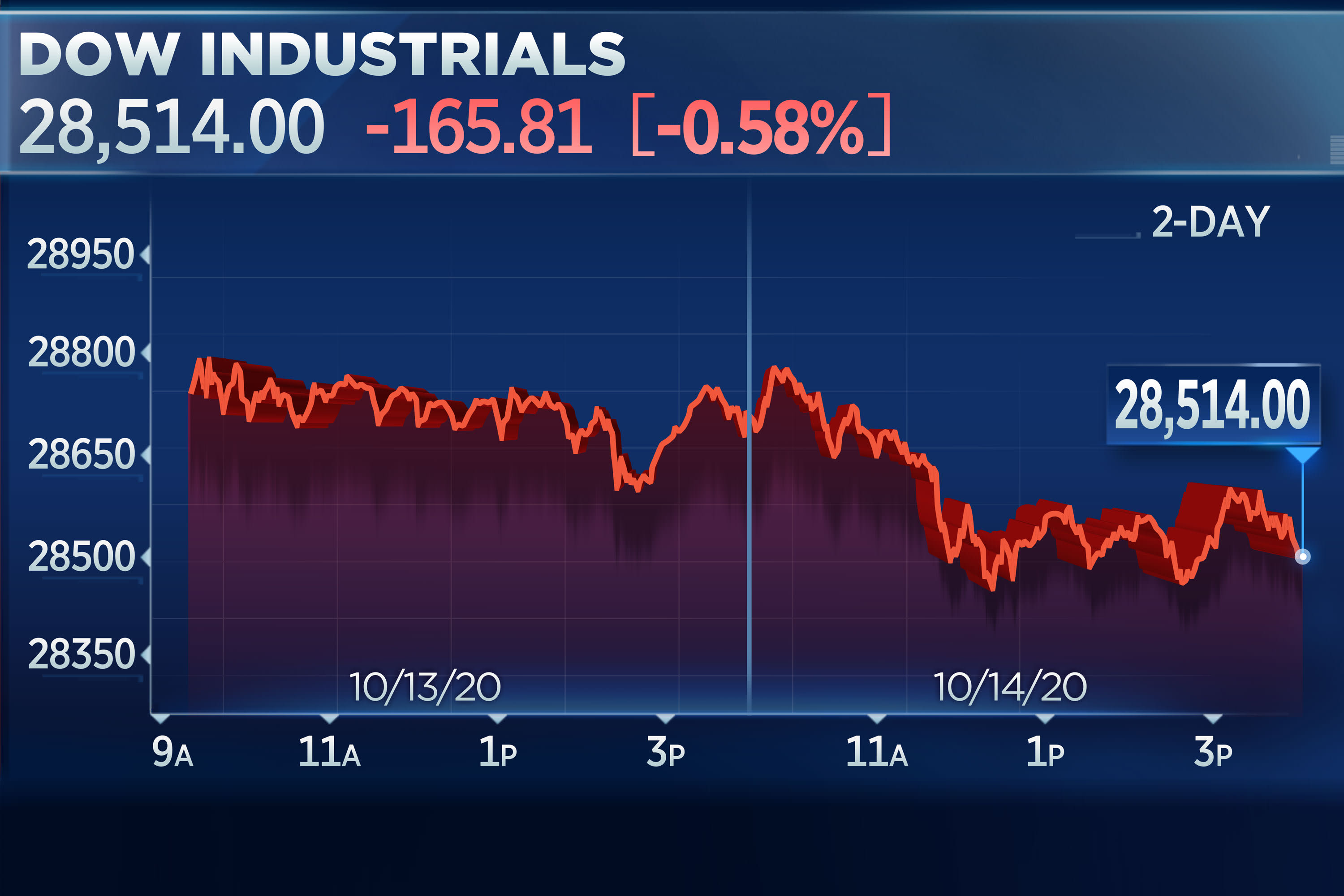Stocks close lower for a second day amid coronavirus aid uncertainty, Dow drops more than 160 points

Stocks fell for a second day on Wednesday after comments from Treasury Secretary Steven Mnuchin dampened expectations of a coronavirus stimulus deal being reached before the Nov. 3 presidential election.
The Dow Jones Industrial Average was down 165 points, or 0.6%, at 28,514. The S&P 500 closed 0.7% lower at 3,488.67 and the Nasdaq Composite slid 0.8% to 11,768.73
Mnuchin said around midday that getting a deal done before the election would be difficult, adding that both sides were still far apart on certain issues. He also noted, however, that Democrats and Republicans are making progress in some areas.
Mnuchin’s comments came after the White House recently proposed $1.8 trillion for an aid package, which House Speaker Nancy Pelosi said “falls significantly short” of what is needed. On Tuesday, Senate Majority Leader Mitch McConnell said that the Senate will vote on a limited stimulus bill later this month, which will be “targeted relief for American workers, including new funding” for Paycheck Protection Program small business loans.
“Investors continue to react to developments on stimulus discussions, despite the fading likelihood that a deal is reached,” said Mark Hackett,” chief of investment research at Nationwide. “The gap between House Democrats and the White House has narrowed to roughly $400 billion … though differences on state and local government funding, healthcare aid and apportion tax credits remain.”
To be sure, a spokesman for Pelosi said she and Mnuchin had a “productive” talk on earlier in the day.
Shares of Amazon slid more than 2% to lead most Big Tech lower. Facebook and Netflix were down 1.6% and 2.3%, respectively and Microsoft slid 0.9%.
The major averages were higher earlier in the day as traders pored through another batch of corporate earnings.
Earnings ‘so far so good’
Goldman Sachs reported quarterly earnings that were much better than expected. The company’s results were driven in large part by strong bond-trading revenue. UnitedHealth reported better-than-expected earnings and revenue for the previous quarter, but the stock fell 2.9%.
Bank of America’s earnings topped analyst expectations but the bank’s revenue missed the mark, sending the stock down 5.3%. Wells Fargo shares dipped 6% as the bank’s third-quarter earnings missed expectations. The bank said its bottom line was impacted by the current low interest rate environment.
“On the earnings overall, so far so good,” said Brent Schutte, chief investment strategist for Northwestern Mutual Wealth Management. “You’re going to see a broadening of earnings growth from where it was, concentrated in a few names, into more sectors and companies.”
Stocks were coming off a downbeat session, snapping a four-day winning streak on Tuesday after Eli Lilly paused its trial of a coronavirus antibody treatment, news that followed Johnson & Johnson’s earlier announcement that it halted its vaccine trial after an “adverse event” was reported.
Despite Tuesday’s and Wednesday’s declines, stocks are higher for October, with the Dow up 2.6% while the S&P 500 and Nasdaq have gained 3.7% and 5.4%, respectively.
“Markets are now hoping for (and trading on) a smooth election, a big stimulus, the end of the pandemic, and the economy being back to 2019 normal early next year,” said Brad McMillan, chief investment officer at $200 billion Commonwealth Financial Network.
However, he noted that the market’s optimism might make it vulnerable to bad news, especially as Covid-19 cases spike in some areas. “While the economy continues to recover, job growth has slowed substantially even as layoffs remain very high—and we are still only halfway back to pre-pandemic employment levels,” he added.
Subscribe to CNBC PRO for exclusive insights and analysis, and live business day programming from around the world.




